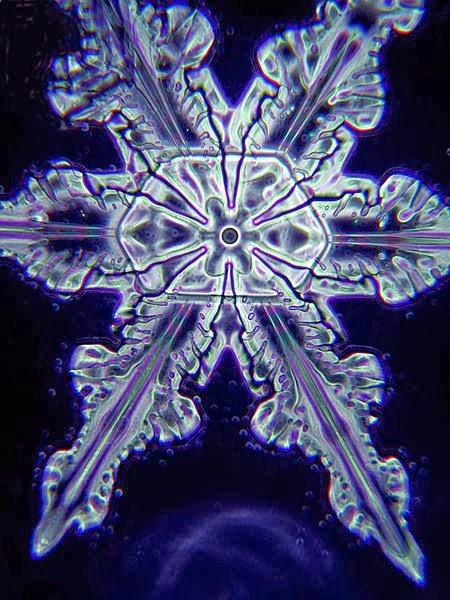The Autistic Christian, part 2
As an autistic person, albeit high functioning, life is a struggle. The world is awesome in its complexity. It

By Michael, Creative Commons
contains all the customary codes of social conduct, a myriad of occupations and vocations, behavioral nuances of every description, emotional obligations, and ethical standards. All of those escape me.In addition, I'm afraid of or intensely dislike the color orange, the telephone ringing, conversation, interruption in my routine, loud noises, certain locations, running into people I know when I'm out of the house, Jiffy Pop, raucous laughter, makeup, fingerpaint, non-symmetrical things, unanswered questions, unfinished conversations, any and all games, unsolved mysteries, and so on. I have issues with sympathy and empathy, I'm a bundle of nerves and I need notes in my pocket to help me remember what to say when I am one-on-one. I'm a loner, eschew fellowship, people in general, and like to study one subject until I exhaust it.
I rigidly adhere to routines, demand my apartment looks a certain way with everything in its place, and only eat a limited range of foods. I haven't been out of my geographical range for five years.
For 43 years I never knew why I thought the thoughts I had, or behaved the way I did, I just knew I was different. I was a disappointment to loved ones, a mystery to teachers, someone pitied by my friends.

Public Domain
I am autistic.In the previous two essays I related my life from birth to 2004 when I was 43 years old. I was not saved and never had steady religious instruction nor attended church in any meaningful way. I was an enemy of Jesus, a craven sinner.
I was lost.
In December 2003 I was saved. In only two weeks, on January 2004 I made some important decisions. I bought and began to read the bible. I grew rapidly in Christ and 18 months later in mid 2006 when I finished my work in Maine I moved to Georgia. I began attending church.
In 2008 I was faced once again with a conundrum of how to maintain myself financially and professionally. Just like going to college in 1978, after my divorce in 1986 and after my other divorce in 2004, I was alone and needed employment in order to support myself. I had sold my business and was living on the proceeds and also supplementing my income with freelance writing for the daily newspaper here in GA. My savings was dwindling fast. I needed a steady job.
Frankly, I was frustrated with myself. Why was it that I never seemed to be able to maintain long-term relationships? Why was it so tough to support myself? Why did I put something on the stove, wander off, and burn it so the smoke alarm goes off and the pan is ruined? Like, every night? Why did I forget to pay bills? Why did I dread being with people? Why was I so rigid in my routine? Why was everything so hard?
Did not he who made me in the womb make him? And did not one fashion us in the womb?
(Job 31:15)I decided to go back to the last job I'd formerly had, in 1990, teaching. I added my name to the sub list and began substitute teaching in my county. The next year I was hired as a Special Education para-professional.
It was through my job I discovered my autism. In working with autistic children, and in studying the Encyclopedia of Autism, and speaking with the professionals I worked with, I finally understood the answers to all the above questions, and more.
However, now I had different questions.

Ice Crystal by yellowcloud
Why did God make me this way? What was it about my personality and brain that could glorify Him uniquely? What were my spiritual gifts?
Being in Christ meant that I was at long last docked in a world where things finally made sense. I finally had found a worthy Person to serve: Jesus. Truth was the highest priority. Finally, the unvarnished truth was valued! Holy living by His set of standards was also the priority. The rules were clearly laid out in the bible. I love that. I have a manual that explains how to love, love, relate, and worship!! It's all written down! No more guessing for me, no sir. And... at long last I'd found a subject I couldn't exhaust. God is infinite and the bible is an infinite training manual. (2 Timothy 3:16).
While media often depicts an autistic person obsessively studying and talking about one subject their whole lives, like trains for instance, all subjects are finite. Eventually one reaches the end of the road with learning it. Or at least I had gone as far as I could given the resources I'd had. For example, I earned a 4.0 in my Masters program of Literacy Education and the only next step I could take was obtaining a PhD, something that would require a great amount of expense and travel for over two hours to the nearest University that offered one in my area of learning. I exhausted journalism, mollusks, heraldry, King Arthur, and education, topics I'd studied at different points in my life. There is no new information to be added to the collection of information about King Arthur, once you've studied it all, you're done. This is disconcerting to an autistic person. I constantly worried about the end, and what to study next.
The bible is infinite!! There never will be an end to it! What a relief!
In addition, the bible lays out clear rules for living, and many how-to's. The routine of going to church is a comfort.
Thus says the Lord, your Redeemer, who formed you from the womb: “I am the Lord, who made all things, who alone stretched out the heavens, who spread out the earth by myself, (Isaiah 44:24)In actuality, Christianity seemed like a perfect fit. In secular life, there are many speculations from unsaved people about the autistic brain and whether an autistic person can accept religion.
Autism May Diminish Belief in God
People who have more traits of autism are less likely to believe in God that those that do not have such traits, according to new research that suggests that belief is boosted by the ability to see into the minds of others. This ability, often called theory of mind, or mentalizing, is diminished in people with autism spectrum disorders, a cluster of conditions marked by communication and social difficulties. Because people's beliefs in God are often marked by feelings of having a personal relationship with the deity, prayer and worship may require a sense of what God could be thinking, researchers report Wednesday (May 30) in the journal PLoS ONE.
Religious Belief Systems of Persons with High Functioning Autism
Persons with autistic spectrum disorder were much more likely than those in our neurotypical comparison group to identify as atheist or agnostic, and, if religious, were more likely to construct their own religious belief system. Nonbelief was also higher in those who were attracted to systemizing activities, as measured by the Systemizing Quotient.
HOGWASH!
Though those articles claim that it is harder for an autistic person to believe in God, personally I believe it is easier. First, the Lord put eternity in the hearts of all men (Ecc 3:11), and “what can be known about God is plain to them, because God has shown it to them”. (Romans 1:19). So in that respect, it is easy to believe in God. But because men are depraved, they suppress what they know about God in unrighteousness. (Romans 1:18). So everyone, autistic or not, has an innate sense of God's existence simply by being alive on His planet.
For you formed my inward parts; you knitted me together in my mother's womb. (Psalm 139:13)Secondly, I mentioned that I spent a great deal of time in the natural world. As a child growing up it was where I went to decompress. I also lived on a sailboat for two years, and in a camper van camping outdoors for three months across country. I traveled a lot and hiked, walked, or otherwise saw many amazing natural sights. It was obvious and logical to me that this world was not an accident from a big bang. It was created. And since it had to have been created, God must have created it. Logically, this conclusion seemed to me to be almost a given.
Thirdly, even though God obviously made the world, I was not so sure about the name of Jesus. God was one thing but Jesus and the whole blood, wrath, and sin thing was another. However every person on the planet who lives nor or who ever lived, except for Jesus, has a sin nature and denies Jesus and their need for a savior as a matter of course. (Romans 3:11; Psalm 53:2). So no one comes to saving grace unless the Spirit draws him, autistic or not. Hence the hogwash comment, scientists. (1 Timothy 6:20). No one can believe in Jesus but everyone can plainly see there is a God (Romans 1:18-21).
I see now in hindsight that Jesus gave me the talent of writing, honed over many decades, so that after I was saved, I could write about Him. He gave me and honed in me the talent of speaking/teaching so I could support myself. When the time came, He gave me the spiritual gift of teaching. (Romans 12:7).
What a grand thing it is as an autistic person to be given an almost inability to lie and a severe love of the truth, and then come into His Truth so as to proclaim it! This is the gift of exhortation. (Romans 12:8). And as an autistic person constantly researching my favorite subjects, I have a tremendous ability to quickly sift through massive amounts of information and dispense with the invalid or useless and detect the useful. Also I can organize massive amounts of information into a coherent progression of thought. And thus He gave me the spiritual gift of Distinguishing of Spirits, or discernment. (1 Cor. 12:10).
I am a spiritual snowflake.
John MacArthur has some thoughts on the spiritual gifts and the dispensing of them

Josef Reischig, Wikimedia CC
I believe that every Christian is a spiritual snowflake. Just like you are literally the only one of your kind, even if you're a twin you're different than your twin. Your fingerprints are different, your teeth are different, and other parts of you are different. Every one of us stamped with absolute uniqueness, we are all creative idiots, in that sense. We are peculiar, we are unique. There's no one like us. We are spiritual snowflakes. And I believe that when the Spirit of God gives to every believer gifts, He gives them individually to each believer absolutely peculiar to that believer.You say, "Well, you know, there's only about a dozen of them listed here. How you going to divide a dozen gifts up among millions of Christians and make them all different?"
Let me tell you how. I believe you have a list of gifts in Romans 12, a list of gifts in 1 Corinthians 12. The fact that they are different shows how much latitude there is in their definition. Paul lists some in the Roman passage, he lists some in the Corinthian passage and there is some duplication and some non‑duplication. And it's almost as if he's just suggesting broad categories. The best way to understand it would be that they're like colors on a palette and each gift would be a color and as God takes His brush and paints you, He dips into different color categories and paints you a unique color. You're not the same as someone else. Even if you had fifteen people or twenty or five thousand who all had a gift of teaching, you could have them all teach and they would all teach differently, uniquely. (source)
As the Spirit does with all people, He gives gifts in various amounts to glorify Jesus so that each one of us uniquely can exalt Him through our walk.
Certain of my struggles in Christianity might be unique to autism but the fact that I am a human being who struggles with sins or with obedience to Jesus is not unique at all. We all have that, no matter who we are. Where the bible says to speak the truth (Ephesians 4:15a) I can do this even when it is uncomfortable. However the verse says to speak the truth in love, and this is harder. I am unfamiliar with the usual expressions of love and I have to work a little harder to be sure not to be ungentle.
2 Timothy 3:14-17 says to study the bible, which is a great and easy thing for me to do because I love to have a study-hobby that will be ever changing and inexhaustible ... now with the eternal benefit of learning about an infinite Savior, but it also says to fellowship and meet together, (1 John 1:3, Hebrews 10:25) something that is very hard for me to do.
So I struggle with fellowship, restoring gently, and mercy, but what human doesn't struggle with some aspect of church life, obedience, or sins? Some struggle with coveting, others lying, or forgiveness. All humans find certain aspects of the rules for holy living difficult. This is a human thing, not necessarily an autistic thing.
My LORD made me. The same hand that knitted me together, autistic brain and all, also stretched out the universe. Since He made me, and all that He does is Good, then it must be good that I am the way I am. The only thing that remains is to revel in His goodness and seek ways to exalt and honor Him.
God created every snowflake in this scene unique, and perfect in its uniqueness. We are all on the same road to glory, which ends at the feet of Jesus.

Iain Thompson, Creative Commons
Who am I to question His knitting of me? He put me on this earth, HIS earth, to enjoy His creation, to live and develop talents, and at His timing to be brought into the Kingdom a repentant sinner so as to glorify Him by the gifts He gave me. It does not matter who is male or female, who is young or old, who is gifted with mercy or who is gifted with teaching. It does not matter who is autistic, who is a paraplegic, who uses a cane to walk into church and who bounds up the steps with energy. It does not matter who was saved young and who was saved old.
"There is neither Jew nor Greek, there is neither slave nor free, there is no male and female, for you are all one in Christ Jesus.." (Galatians 3:28).
In Christ, I am not autistic. The only label that eternally matters is that I am called a child of the Most High God. What a glorious label!
for in Christ Jesus you are all sons of God, through faith. (Galatians 3:26)
~~~~~~~~~~~~~~~~~~
Further reading
The Autistic Christian, part 1
The Autistic Christian, part 2
The Christian Institute on Disability
How should Christian parents respond if their child has a learning disability?
What effects do conditions like autism, attachment disorder, ADHD, etc., have on the Christian life?
